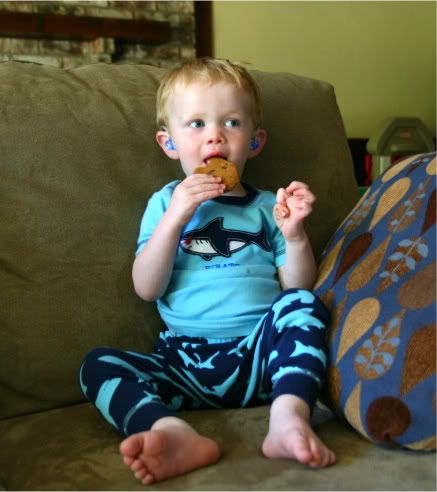
I was pretty sure Nolan had failed his sleep study, so I had Dennis come with me to the doctor's appointment. That turned out to be a good idea, since my instincts were correct: the supraglottoplasty has been entirely unsuccessful. His obstructive apnea remains, at about the same AHI (apnea-hypopnea index) as before the surgery.
In our quest to quell the apnea, nothing has worked. The tonsillectomy and adenoidectomy were useless - a procedure that cures obstructive apnea in over 90% of children with the condition. The supraglottoplasty was unsuccessful, which cures obstructive apnea in over 95% of children with laryngomalacia-induced airway problems.
The reason for the failure? Reflux. You have to say it like a dirty word to get the gist of how I feel about it - it has caused so many problems for Nolan, and nothing seems to work to counteract it.
We can hear the stridor returning. The apnea is obviously still there. Whether the reflux is causing the apnea because of a relapse of the laryngomalacia, or causing Nolan to obstruct on the reflux itself, is unclear. We do have evidence that he is failing his pH probes on the Zantac and Nexium, and the respiratory issues remain.
The ENT cannot do anything else for him, since the reflux will destroy any effort to surgically correct the apnea again. She recommended a procedure called a fundoplication, which I'll cover in another post. Trust me, there is no "fun" in fundoplication.
The surgery is irreversible and can be associated with gas bloat, retching, and a need to do more fundoplication procedures in the future. Most kids still have to take anti-reflux medication after the fundoplication is performed.
On the other hand, some children have great success with the procedure, and become totally free of apnea. Unfortunately, there is no way to tell if Nolan will be a success story or if he will have problems after the procedure is completed.
A C-Pap is not recommended for children with uncontrolled, severe reflux because the machine holds the airways open. Since Nolan's airway is likely contracting (laryngospasm) to prevent the reflux from entering his lungs, a machine that forces his airways open will simply provide a clear passageway for the acid to enter his lungs. Essentially, we'd be trading sleep apnea for aspiration pneumonia. I would like to get a second opinion on the matter, however, so I have made an appointment with the sleep neurologist for June 21.
We have decided to hold off for now. Nolan does have apnea, and the apnea will have to be addressed at some point in time: it can cause everything from learning issues, to CO2 retention, to cor pulmonale. For now, Nolan is not retaining CO2 and is growing, even if he is not sleeping well. We want to give him a few months on the high-dose Nexium (20mg, 2x per day) to see if it helps. If he is not clinically improved in September, then we will revisit the fundoplication idea and see a general pediatric surgeon.
In the meantime, we have requested another visit to genetics. Our ENT feels that Nolan does not have a syndrome. There are a lot of reasons for this: primary among them is that Nolan has normal cognition and no major problems with his heart or other metabolic processes. On the other hand, we are concerned that our not-quite-four year old child has had so many surgical procedures. We have a child with a congenital mixed hearing loss, urology issues, mild tone issues, laryngomalacia,
severe extra-esophageal reflux disease, amblyopia/astigmatism, and chronic sinusitis/ear infections, and sleep apnea. Granted, many of these issues could be attributed to the reflux (the ear infections, sleep apnea, laryngomalacia, and sinusitis). The others, however, seem rather atypical. I don't know of many four year olds who wear hearing aids, are recommended for fundoplication, have airway issues, wear glasses,
and have urology issues. Certainly, it is possible that Nolan got hit by lightning several times in a row - it just doesn't seem very likely.
I am going to make an appointment with Cleveland Clinic genetics to rule out any genetic or metabolic syndrome. Before we even consider a fundoplication, I need to make sure that there are going to be no more "surprises" that could complicate things.
In the meantime, our ENT wants another upper GI barium swallow test. I'm not quite sure why this is: when Nolan had his first upper GI barium swallow, the results were entirely normal. It isn't a very sensitive test for reflux (the gold standard is an impedance probe, or for LPR reflux, a pharyngeal probe). We know he has severe reflux, and I doubt his anatomy has changed during the past two years - though perhaps the test will show whether he is aspirating his reflux (barium would show up in the lungs in this instance).
I am waiting for the sleep study report to get mailed to us (the ENT's office printer was not functional, so I am
still waiting for my child's medical records). For us to effectively advocate for Nolan (and to make the best medical decisions), we need access to the full report and the recommendations included by the sleep neurologist.
It looks like this summer is going to be rather busy...



























